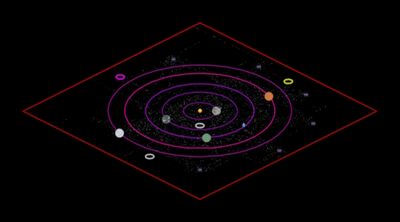Asteri System: Difference between revisions
No edit summary |
Bwazedilla (talk | contribs) No edit summary |
||
| Line 31: | Line 31: | ||
===Chandra=== | ===Chandra=== | ||
{{Main|Chandra}} | {{Main|Chandra}} | ||
'''Chandra''' is the first planet located in the Asteri system. Despite its close proximity to the Asterian star and lack of an atmosphere, hostile lifeforms roam the craters which cover the planet's surface. | '''Chandra''' is the first planet located in the Asteri system. Despite its close proximity to the Asterian star and lack of an atmosphere, hostile lifeforms roam the craters which cover the planet's surface. | ||
===Ilius=== | ===Ilius=== | ||
{{Main|Ilius}} | {{Main|Ilius}} | ||
'''Ilius''' is the second planet located in the Asteri system. Most notable for its academy on galaxywide basics and a balanced environment perfect for livestock. Not to be confused with the Ilios System; That's a lot bigger! | '''Ilius''' is the second planet located in the Asteri system. Most notable for its academy on galaxywide basics and a balanced environment perfect for livestock. Not to be confused with the Ilios System; That's a lot bigger! | ||
===Luxiterna=== | ===Luxiterna=== | ||
{{Main|Luxiterna}} | {{Main|Luxiterna}} | ||
'''Luxiterna''' is the third planet located in the Asteri system. It's (supposed to be) bathed in eternal night, and massive mushrooms sprout from its vibrant surface. Researchers speculate the fungi's bioluminescence is a result of the planet's irradiated soil. | '''Luxiterna''' is the third planet located in the Asteri system. It's (supposed to be) bathed in eternal night, and massive mushrooms sprout from its vibrant surface. Researchers speculate the fungi's bioluminescence is a result of the planet's irradiated soil. | ||
===Herdoli=== | ===Herdoli=== | ||
{{Main|Herdoli}} | {{Main|Herdoli}} | ||
'''Herdoli''' is the fourth planet located in the Asteri system. A desert planet whose ochre sands contain copper-rich sediment. Devoid of flora to take shade under, one endemic species of hostile fauna is naturally resistant to solar radiation. | '''Herdoli''' is the fourth planet located in the Asteri system. A desert planet whose ochre sands contain copper-rich sediment. Devoid of flora to take shade under, one endemic species of hostile fauna is naturally resistant to solar radiation. | ||
===Rubaciea=== | ===Rubaciea=== | ||
{{Main|Rubaciea}} | {{Main|Rubaciea}} | ||
'''Rubaciea''' is the fifth planet located in the Asteri system. Its heavily glaciated surface is interrupted by abundant cracks and cliffs. Beneath the snow flats are huge caverns and chasms which occupy most of the underground, humming with energized materials. | '''Rubaciea''' is the fifth planet located in the Asteri system. Its heavily glaciated surface is interrupted by abundant cracks and cliffs. Beneath the snow flats are huge caverns and chasms which occupy most of the underground, humming with energized materials. | ||
==References== | ==References== | ||
{{Navbox_space}} | |||
[[Category:Asteri]] | [[Category:Asteri]] | ||
[[Category:Systems]] | [[Category:Systems]] | ||
[[Category:Geography]] | [[Category:Geography]] | ||
Revision as of 04:14, 27 December 2024
| Asteri system | |
 The Asteri system, viewed from the side | |
| Properties | |
|---|---|
| System size | 60000, 60000 |
| Planets | Chandra |
The Asteri System is a star system located in the southwest corner of the Galaxy. It is the largest system compared to its neighbors, with five planets orbiting its star. Common asteroids contain Chetherite, Coal, and Iron.
Gates
Gates to Regulus
Asteri to Regulus North (53500, 15000) (to Regulus to Asteri North)
Asteri to Regulus Central (57000, 30000) (to Regulus to Asteri Central)
Asteri to Regulus South (50000, 50000) (to Regulus to Asteri South)
Gates to Sirius
Asteri to Sirius East (42500, 6500) (to Sirius to Asteri East)
Asteri to Sirius Central (25000, 5000) (to Sirius to Asteri Central)
Asteri to Sirius West (8000, 17000) (to Sirius to Asteri West)
Planets
Chandra
Chandra is the first planet located in the Asteri system. Despite its close proximity to the Asterian star and lack of an atmosphere, hostile lifeforms roam the craters which cover the planet's surface.
Ilius
Ilius is the second planet located in the Asteri system. Most notable for its academy on galaxywide basics and a balanced environment perfect for livestock. Not to be confused with the Ilios System; That's a lot bigger!
Luxiterna
Luxiterna is the third planet located in the Asteri system. It's (supposed to be) bathed in eternal night, and massive mushrooms sprout from its vibrant surface. Researchers speculate the fungi's bioluminescence is a result of the planet's irradiated soil.
Herdoli
Herdoli is the fourth planet located in the Asteri system. A desert planet whose ochre sands contain copper-rich sediment. Devoid of flora to take shade under, one endemic species of hostile fauna is naturally resistant to solar radiation.
Rubaciea
Rubaciea is the fifth planet located in the Asteri system. Its heavily glaciated surface is interrupted by abundant cracks and cliffs. Beneath the snow flats are huge caverns and chasms which occupy most of the underground, humming with energized materials.